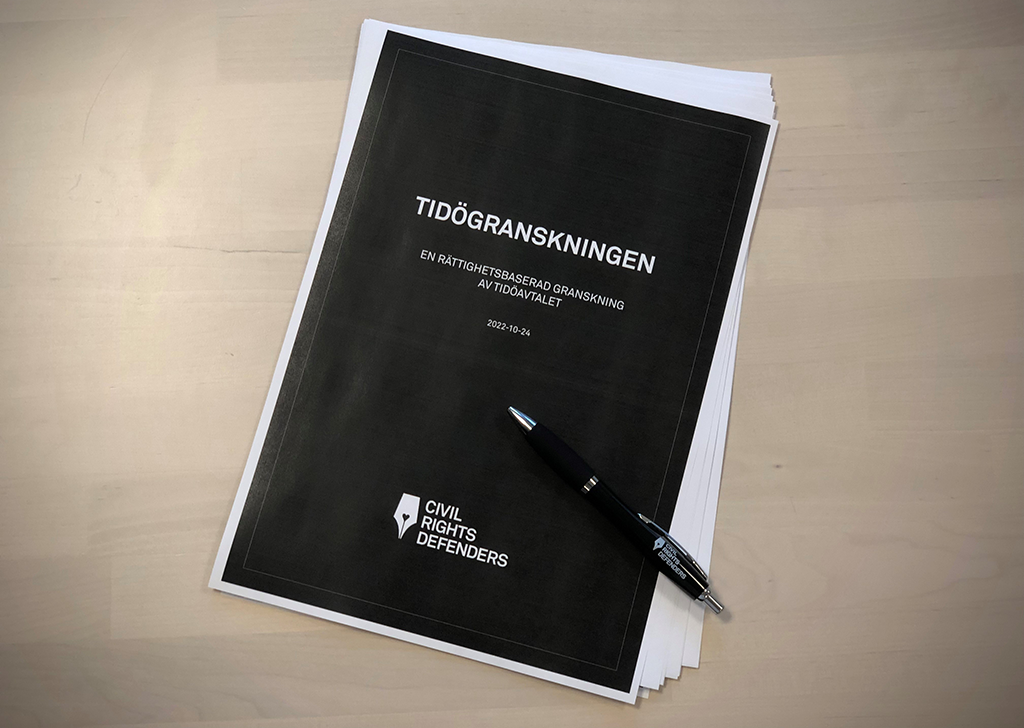Our review of the Tidö Agreement (Tidöavtalet)

UPDATE: The full translation is now available. It’s accessed through the button at the end of this article.
Civil Rights Defenders has reviewed the cooperation agreement, the “Tidö Agreement” (Tidöavtalet), which was presented by the Moderate Party, the Christian Democrats, the Liberals and the Sweden Democrats on 14 October 2022. The review is done from a rights-based perspective and highlights parts of the agreement that are not in line with strong protection for freedoms and rights in Sweden according to our assessment. We have primarily reviewed the areas of criminal policy, migration policy, and the rule of law.
“As a human rights organisation, we are very concerned about the content of the Tidö Agreement. It contains a series of measures that clearly go against the human rights standards that Sweden is bound by”, says John Stauffer, Legal Director and Deputy Executive Director at Civil Rights Defenders.
Ahead of the 2022 election, we reviewed all parliamentary parties’ election manifestos from a rights-based perspective. We have now done the same with the Tidö Agreement.
The areas primarily reviewed are criminal policy, migration policy, and the rule of law, of which the first two comprise a large part of the agreement. Other relevant areas are also reviewed.
The review has a rights-based perspective, which means it is based on international, regional, and national commitments on human rights to which Sweden is bound. Examples are the UN Convention on Civil and Political Rights, the European Convention, the EU Charter of Fundamental Rights, and the Swedish constitution. They establish fundamental freedoms and rights for individuals and states’ obligations to respect and protect them.
The agreement contains a large number of measures, many of which are dependent on further investigations. We don’t know yet what the law or new policy will be or look like if it would become a reality. But the agreement’s measures point in a worrying direction and send signals that are serious in their own right.
An agreement for Sweden to be more repressive and deprived of rights
The agreement is clearly repressive. It is focused on detentions (including those of children and young people), harsher sentences, increased opportunities to monitor and deport people, and measures that undermine the rule of law and human rights. There are measures aimed at making it more difficult to be a refugee, undocumented, or an asylum seeker where the overall goal is to reduce migration, regardless of the consequences it may have for the individual’s human rights or dignity. There is also a recurring confusion, or equation, between migration and criminality, that singles out people with migration experience as the cause of Sweden’s problems.
Actions regarding criminal policy follow a trend that we see all over Europe, often called “Penal Populism”.
This means that policymakers focus on criminal penalties as they increase their popularity with voters, rather than their crime prevention effects. Meaning that policymakers focus on criminal penalties, rather than crime-prevention effectiveness, as it increases their popularity with voters. Research and experience from other countries do not support that harsher punishments reduce crime. According to human rights, criminal penalties must be proportionate.
We also note that several of the measures would directly conflict with international and regional obligations and conventions to which Sweden has committed itself, as well as with our own constitution.
The agreement undermines the principles of rule of law
If the agreement’s proposed measures become a reality, we will have a society that no longer rests on the rule of law’s basic principle of everyone’s equality before the law. Rights will not be based on people’s needs but on their group affiliation and legal status. It creates a hierarchy between people in Sweden, people with citizenship at the top and vulnerable groups and racialised people at the bottom.
In the end, this does not only affect these groups but also has a negative impact on society as a whole and all our rights. It will undermine human rights, the rule of law, and liberal democracy for all of us.
The Tidö agreement shows that the global trend of dismantling democracy has come to Sweden. We have worked for human rights globally for 40 years, and these experiences now come in handy when we need to focus more on defending fundamental freedoms and rights at home.
READ THE FULL REVIEW HEREContact
For questions about our review, contact us at press@crd.org.


